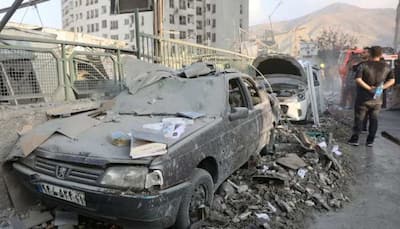New Delhi: Israel initiated military strikes inside Iran in the wee hours of June 13. Ordered by Prime Minister Benjamin Netanyahu, these precise attacks are set to continue “as long as necessary”. The meticulously planned assault focused on military and governmental targets in Tehran. A top Islamic Revolutionary Guard Corps (IRGC) leader, chief of staff of the country’s armed forces and senior nuclear scientists were killed in the assault.
Israel maintains Iran poses a serious threat, arguing that a nuclear-armed Tehran would erase Tel Aviv’s military edge. Publicly, Iran insists its nuclear ambitions are peaceful. Netanyahu painted the potential timeline in stark terms, warning Iran could build a bomb “within a few months” or a year. A military official added that Iran already held “enough fission material for 15 nuclear bombs within days”.
Moments ago, Israel launched Operation “Rising Lion”, a targeted military operation to roll back the Iranian threat to Israel’s very survival.
This operation will continue for as many days as it takes to remove this threat.
——
Statement by Prime Minister Benjamin Netanyahu:
— Benjamin Netanyahu – בנימין נתניהו (@netanyahu)
The International Atomic Energy Agency (IAEA) has stated that Iran did not comply in full with Nuclear Non‑Proliferation Treaty obligations, though the agency has not declared Iran is pursuing a weapon. U.S. intelligence confirmed that Iran halted its nuclear weapons ambitions in 2003 and has not been caught pursuing active development.
Observers note that Iran is often described by Israeli officials as the centerpiece of a wider alliance, including Hezbollah, Hamas and others, forging what some call an “axis of resistance” across the region.
Even before Friday’s strikes, Israel had carried out extensive campaigns against Hezbollah and Hamas, significantly weakening these groups. Israeli hawks have suggested now might be a chance to further degrade Iran’s influence – possibly even from within its regime. That scenario would likely require a protracted campaign, and observers believe Israel may not be prepared to sustain.
Inside Israel, political dynamics may have played a role. Faces charges and faltering public support have driven Netanyahu to rely on national security issues to rally backing. Analysts argue that this strike could be aimed at shoring up political stability rather than responding to an immediate threat.
Both Israeli and international scrutiny will now focus on possible Iranian military retaliation. Legal experts are watching whether Israel might be infringing the rules that allow only “imminent” self-defense. U.N. Charter guidelines limit the legitimacy of preemptive strikes to clear, immediate dangers – something critics say Israel has not proven existed.
This military escalation adds a volatile chapter to Middle East tensions. Whether Israel’s strikes deter or inflame Iran remains uncertain, but the events mark a major turning point in regional security.
Stay informed on all the , real-time updates, and follow all the important headlines in and on Zee News.







